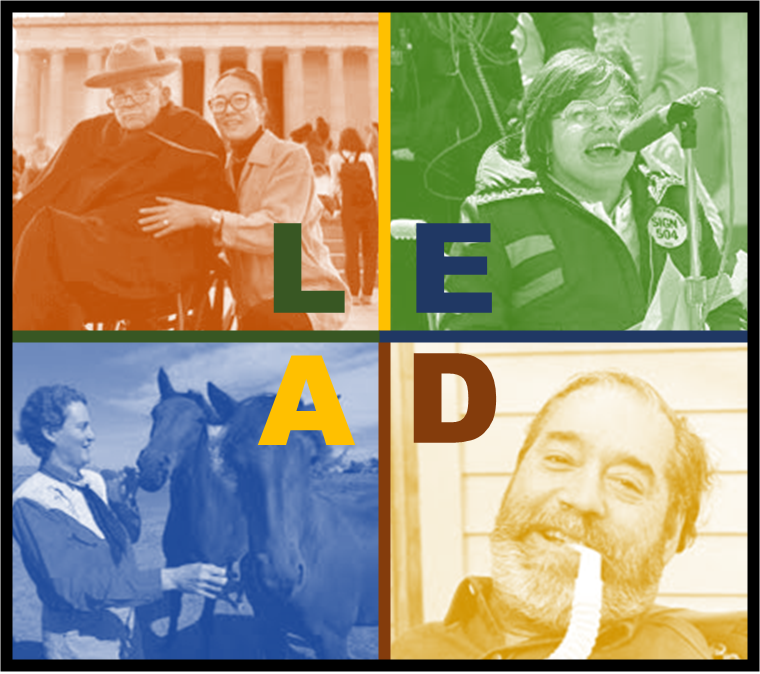Do you know what it takes to be a leader?
This is one of the questions discussed in our student leaders’ program at Bender Leadership Academy. It is important to remember that leaders aren’t born, they are made. We become leaders by taking specific actions and through the choices we make every day. People with disabilities can become CEOs, Presidents, and civil rights advocates. In fact, many leaders of the disability community today started advocating as high school and college students for a more just and equitable society.
What can you do now to demonstrate that you are ready to lead? Let’s explore some of the lessons we have learned from leaders in our community.
Listen attentively.
Listening to someone demonstrates that you are respectful and caring. Listening doesn’t mean you are agreeing, it means that you understand that everyone’s voice is important.
Justin Dart, Jr. is considered to be one of the biggest leaders and influencers in the disability civil rights movement. He knew how important it was for people living with disabilities to come together and share their collective experiences to build a sense of community and to support each other’s journey during this time. Justin traveled with his wife, Yoshiko, throughout 50 states and some U.S. Territories 5 times, meeting and listening to different groups within the disability community, to ensure they all had a voice at the table and that their needs were recognized.
Engage with positive energy.
People follow people who believe in their cause and are passionate about making a difference. Positive energy attracts others, just as negative energy repels. When you care about something, you don’t give up just because the first person you talk to tells you ‘no.’ Instead you find the energy inside yourself to persevere.
Judy Heumann was denied the right to attend school at the age of five because she was considered a “fire hazard” because she used a wheelchair. She never forgot the lesson that if she wanted something she had to fight for it. Judy went on to be a founding member of the Berkeley Center for Independent Living and co-founder of the World Institute on Disability. She was also a part of a group of advocates who worked to implement IDEA, Section 504, the Americans with Disabilities Act, and the Convention on the Rights of Persons with Disabilities.
Add value.
Many people who become leaders do so out of a desire to make a difference. They don’t start out with the intent of being famous, they start out with an idea of how to add value. Whether it is an idea of how to improve something, make something easier, or even just a willingness to do the things nobody else wants to do – their focus is on what value their actions provide.
Dr. Temple Grandin is one of the most famous autistic people in the world. She is a professor, an author, and animal behaviorist. She is an advocate for people living with autism and the humane handling of livestock. As a kid, Dr. Grandin was teased and bullied in high school. Today, half the cattle in the United States are handled in facilities she has designed. She didn’t start out to become an advocate, she used logic and her mind to address a problem she cared deeply about and added value.
Demonstrate initiative.
To be a true leader, you have to be ready to take action. You can’t just wait for someone else to fix things. You need to be the one who is willing to speak up and then follow that up by getting things done. When you demonstrate initiative, you demonstrate commitment. Whether that commitment is to helping your employer be successful, helping your team do the best they can on a school project, or helping your community to solve a problem, initiative is key to being a leader. Leaders take initiative and responsibility, while followers wait for someone else to tell them what needs to be done.
Ed Roberts was the father of the Independent Living movement. He advocated for people with disabilities to have a choice in how they live their lives and for them to be able to fully participate in society. The first person with a significant disability to attend UC Berkeley, Ed lived in the Student Health Center since the college dorms were not accessible. He founded an advocacy group called the Rolling Quads which advocated for better accessibility on campus.
Being ready to L.E.A.D. means learning now to behave like a leader. You can start by demonstrating the qualities discussed here. To learn more about disability leaders, check out Disability Matters on Voice America, and discover other leaders in the disability community.
